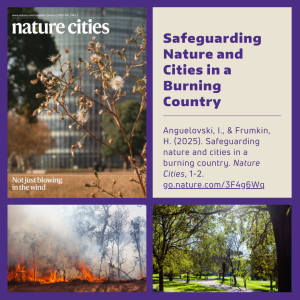Safeguarding Nature and Cities in a Burning Country
Citation
Anguelovski, I., & Frumkin, H. (2025). Safeguarding nature and cities in a burning country. Nature Cities, 1-2. doi.org/10.1038/s44284-025-00210-4
Big wildfires around Los Angeles are a strong reminder that people and nature are closely connected. Fires in the western U.S., and in other places like Athens, Sydney, and Valparaíso, show how city communities can be at risk when natural areas are not cared for properly. The 2025 fires in Los Angeles destroyed about 16,000 buildings and put many more in danger. These events have raised big questions about how we prevent and manage wildfires. Political transitions may make it harder to create a shared plan for making cities and nearby nature safer and stronger in the future. Even though a lot of focus is on the U.S. right now, other countries are also facing climate disasters and political changes. This shows how important it is for people around the world to work together to protect the environment and manage the climate crisis with shared goals and values.
Abstract
 Raging fires around Los Angeles are another stark reminder of how deeply our lives are intertwined with nature. Fires in the western USA — as with fires around Athens, Sydney or Valparaiso — expose not only the vulnerability of urban communities but also the neglect and overexploitation of the natural systems that sustain us and protect cities. As flames consumed forests, homes and infrastructure in Los Angeles in early 2025 (destroying 16,000 buildings, with thousands more facing continued risk), the controversies around fire prevention and management are likely to burn through political opportunities to build a common vision for a resilient and sustainable future in and around urban areas. Although the Los Angeles fires and political shifts in Washington cast attention on the USA, recent climate emergencies and political transitions to the right or extreme-right internationally call for invoking shared values in the management of the climate crisis and the protection of natural resources.
Raging fires around Los Angeles are another stark reminder of how deeply our lives are intertwined with nature. Fires in the western USA — as with fires around Athens, Sydney or Valparaiso — expose not only the vulnerability of urban communities but also the neglect and overexploitation of the natural systems that sustain us and protect cities. As flames consumed forests, homes and infrastructure in Los Angeles in early 2025 (destroying 16,000 buildings, with thousands more facing continued risk), the controversies around fire prevention and management are likely to burn through political opportunities to build a common vision for a resilient and sustainable future in and around urban areas. Although the Los Angeles fires and political shifts in Washington cast attention on the USA, recent climate emergencies and political transitions to the right or extreme-right internationally call for invoking shared values in the management of the climate crisis and the protection of natural resources.